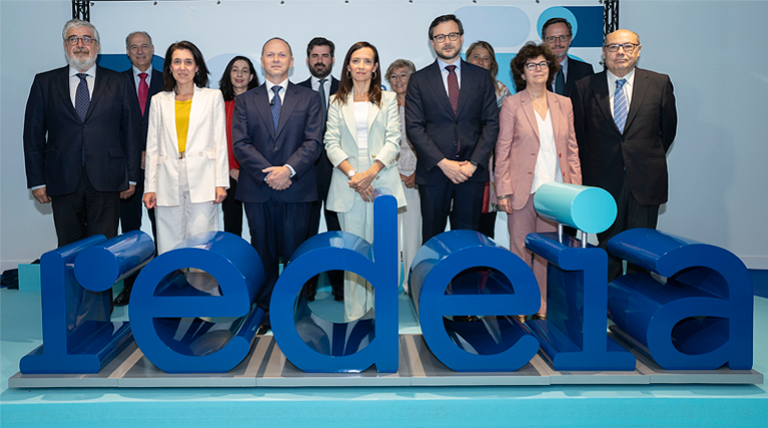We are a global operator of essential infrastructure
- Through the creation of the 'Offshore Coalition for Energy and Nature' in the Mediterranean (MED OCEaN), an initiative driven by the Renewables Grid Initiative (RGI).
- The OCEaN initiative has been up and running in Northern Europe since 2020 to boost the development of offshore wind energy and the grid necessary for its connection, with solutions that also guarantee the protection and restoration of nature in the North and Baltic Seas. Now this initiative is coming to the Mediterranean.
- The TSO model, predominant in Europe, has proven to provide technical and economic efficiencies, benefits in terms of system robustness and security, and also guarantees neutral access to infrastructure, allowing orderly development, with less impact on the marine environment, and non-discriminatory access for offshore wind generation.
The transmission agents and operators of the Spanish, French and Italian electricity systems (Red Eléctrica de España, RTE and Terna, respectively), together with NGOs and the wind industry, are finalising the launch of the 'Offshore Coalition for Energy and Nature' in the Mediterranean (MED OCEaN). This initiative, which already exists in Northern Europe and is driven by the Renewables Grid Initiative (RGI), was presented during WindEurope 2022, the global wind industry meeting currently being held in Bilbao with the support of the European Commission in order to discuss the sustainable expansion of offshore wind and the necessary development of the grid to make it possible.
Offshore wind energy is a key element to increasing the security of electricity supply in Europe and contributing to achieving the climate neutrality goals for 2030 and 2050. Thus, Mediterranean countries play a key role in its development, which is expected to reach more than 76 GW of installed offshore power capacity by 2050. To achieve this, it is important to carefully plan and manage its expansion, which is still at an early stage of development.
The Chairwoman of Red Eléctrica, Beatriz Corredor, attended the meeting and stressed that "coordination between all parties will be essential for this development to be as effective and efficient as possible, limiting its impact on both the communities and the biodiversity of the natural environment, through dialogue with the territories". And she added, "we believe that for it to be a success, the TSO model must prevail, that is, one in which the transmission agent and operator of the electricity system builds, operates and maintains the offshore marine grid infrastructure necessary for its connection to the onshore grid, contributing all its knowledge and expertise. This model, predominant in Europe, has proven to provide technical and economic efficiencies, benefits in terms of robustness and security of the system and also guarantees neutral access to marine grid infrastructure, allowing an orderly development, with less impact on the marine environment, and favours non-discriminatory access to this type of generation. At Red Eléctrica we are ready to do this".
For his part, Giles Dickson, CEO of WindEurope, pointed out that the 76 GW of offshore wind planned for the Mediterranean by 2050 "would mean up to 100 billion euros in new investments and would contribute to improving energy security in the Mediterranean basin. To tap into this potential, countries should introduce clear targets for offshore wind, ensure the relevant permitting decisions are taken efficiently and that they coordinate and collaborate with each other. Furthermore, it is essential that this development be done in an environmentally friendly way".
For Antonella Battaglini, CEO, RGI: “The current energy crisis confirms that we need to massively expand European renewable energy generation, deploy electricity grid infrastructure to enable deep electrification. The Mediterranean due to its rich biodiversity and early stage of offshore developments offers us a unique opportunity to prove that it is possible to build energy infrastructure while protecting and restoring nature. Cross sectoral solutions will decrease European dependencies and deliver sound ecosystems able to sustain economic activities”.
SEO/BirldLife's Environmental Governance Officer, David Howell, said, "It is essential that the energy transition be accelerated while addressing another major global challenge: curbing and reversing biodiversity loss. Spatial planning and positive impact industry practices play a vital role in both onshore and offshore infrastructure developments. In the case of offshore wind energy, we must maintain a close and continuous dialogue among all stakeholders to help find and promote the right solutions and thereby generate and maintain investor and public trust."
The 'Offshore Coalition for Energy and Nature' (OCEaN) has been working on bringing offshore energy and grid development together with solutions for robust nature protection and restoration in the North and Baltic Seas since 2020. Now, this initiative is coming to the Mediterranean basin.
About the Renewables Grid Initiative (RGI)
The Renewables Grid Initiative is a unique collaboration of NGOs and TSOs from across Europe engaging in an ‘energy transition ecosystem-of-actors’. We promote fair, transparent, sustainable grid development to enable the growth of renewables to achieve full decarbonisation in line with the Paris Agreement. RGI Members originate from a variety of European countries, consisting of TSOs from Belgium (Elia), Croatia (HOPS), France (RTE), Germany (50Hertz, Amprion, TenneT and TransnetBW), Ireland (EirGrid), Italy (Terna), the Netherlands (TenneT), Portugal (REN), Switzerland (Swissgrid) and Spain (REE); and the NGOs BirdLife Europe, Climate Action Network (CAN) Europe, FNE, Friends of the Earth Ireland, Fundación Renovables, Germanwatch, Legambiente, NABU, Natuur&Milieu, the Royal Society for the Protection of Birds (RSPB), WWF International and ZERO. RGI was launched in July 2009.
More information: www.renewables-grid.eu
About the 'Offshore Coalition for Energy and Nature' (OCEaN)
RGI is among the founding members of the Offshore Coalition for Energy and Nature (OCEaN) in the North and Baltic seas and since 2020 acts as its convener and moderator. The OCEaN is a coalition of NGOs, industry and transmission system operators (TSOs) who have joined forces to cooperate on the sustainable development of offshore wind energy and infrastructure, while ensuring alignment with nature protection and healthy marine ecosystems. Today it comprises 26 organisations.
More information: https://offshore-coalition.eu/














